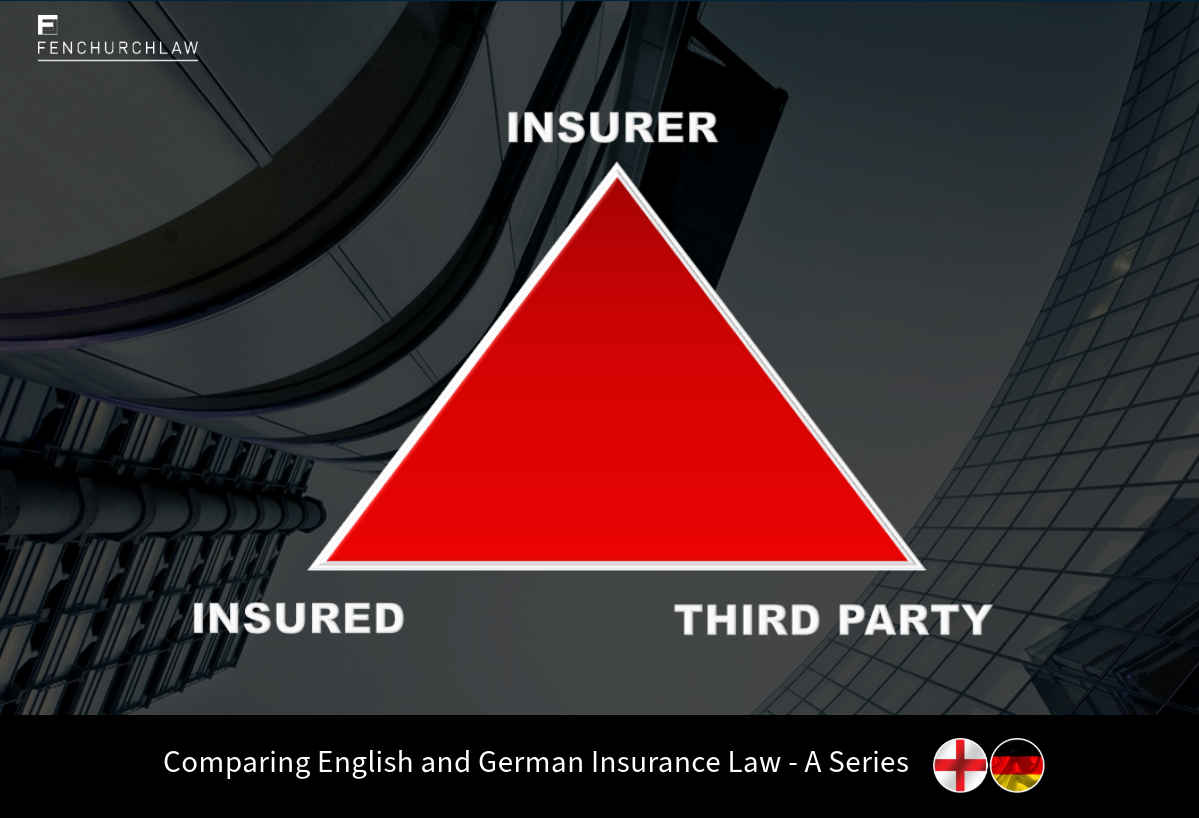Fenchurch Law announces Singapore expansion plans
Fenchurch Law, the UK’s leading firm working exclusively for insurance policyholders and brokers, plans to offer its specialist legal support outside of the UK for the first time, announcing plans for the opening of a new office in Singapore.
Through its new hub, Fenchurch Law will be working with policyholders and brokers from across Singapore and the wider Asia-Pacific region to provide first-class support on high value, complex, commercial insurance coverage disputes, as it has done in the London Market since 2010.
The firm’s international expansion follows the recent announcement that it had transitioned to an employee-owned business model through the launch of an Employee Ownership Trust (EOT), which saw 60% of its shares awarded to its people. Fenchurch Law will be the first EOT business to operate in Singapore.
Managing Partner at Fenchurch Law, David Pryce, commented: “As a purpose driven organisation, we exist in order to help level the playing field between policyholders and their insurers. This is a need that exists in all insurance markets around the world, and we’re delighted to be taking the first step in furthering our purpose internationally with the opening of our Singapore office."
Comparing English and German Insurance Law - Part 2: A Third Party’s Right to Claim Directly Against Insurers
Insurers have deep pockets, while the average person on the street is incapable of paying claims for significant damages. That makes insurers, in most cases, a far more attractive target to claim against compared to the person that caused the damage. This article will give an overview of the different positions in England and Germany with respect to a third party’s right to claim directly against insurers. It focuses on the direct rights which result from statutory law, and does not cover the possibilities to claim against an insurer following a contractually agreed assignment of rights from the insured to the third party.
Insurance and Third Parties
In considering this issue, it is worth looking at the aim of an insurance contract. Typically, insurance is taken out by a policyholder to avoid a situation where it cannot afford to make good what was lost. For example, fire insurance is purchased because the insured wants the insurer to provide the money that is needed to rebuild the home that was burnt down. A doctor takes out professional indemnity insurance to be protected from the financial ruin which would follow if they had to pay compensation for a serious error.
The latter example is different from the former. In the first example, the only parties affected by the insurance contract are the insurer and the homeowner. In the second example, there is another person who has an interest that insurance is taken out: the patient, i.e., the third party.
Thus, depending on the nature of the insurance contract, there might be more than just the insured who has an interest that there is insurance in place. Therefore, it can be said that in some cases, in addition to the obvious purpose of protecting the policyholder from financial ruin, the insurance contract is also meant to provide protection for a third party. This is why in some cases the legislature has decided to make insurance compulsory, with motor insurance being the prime example.
The relevant legislation
There are essentially two pieces of legislation in England which are relevant to this issue: The Third Parties (Rights against Insurers) Act 2010 and the European Communities (Rights against Insurers) Regulations 2002. The latter remains in force following Brexit.
In Germany, the relevant provision is § 115 Versicherungsvertragsgesetz (VVG, “Insurance Contract Act”).
Motor insurance
In both England and Germany, the law provides the victim of a motor accident with a right to claim directly against the liable person’s insurer.
In England, a victim of a motor accident has a direct claim against the driver’s insurers pursuant to regulation 3(2) of the European Communities (Rights against Insurers) Regulations 2002. The right arises when the conditions of the regulations are met. Importantly, the victim must be a resident of one of the EEA states (regulation 2(1)) and the accident must have happened on a road or public place in the UK. Furthermore, the vehicle must be insured according to the requirements of section 145 of the Road Traffic Act 1988 as well as normally based in the UK (regulation 2). As a result, the third party has the exact same rights against the insurers as the insured itself.
The position is in essence the same under German law. Pursuant to § 115 I 1 Nr. 1 VVG, an injured person can directly claim against the liable person’s insurer.
Other liability insurance
For liability insurance other than motor, the laws of both countries differ fundamentally.
England
In England, the relevant Act for other liability policies is the Third Parties (Rights against Insurers) Act 2010. Prior to this Act’s predecessor (the similarly named 1930 Act), it was seen as unjust that a third party that had a valid claim against the insured was left in a vulnerable position in cases where the insured became insolvent: in these instances, any insurance monies went into the general pool for the insured’s general creditors,[i] and often the third party was left without any remedy. The 1930 Act provided, as does the 2010 Act, that the insured’s rights against its liability insurers are transferred to the third party.
The sole trigger for the direct claim against the insurer is that the insured becomes a “relevant person” pursuant to section 1 of the 2010 Act. This term is defined in the Act, but it essentially applies when the insured becomes insolvent. Consequently, in England, a person that suffered loss through the conduct of an insured that has valid liability insurance cover in place can directly claim against the insurers if the insured is insolvent.
Germany
Pursuant to § 115 I 1 Nr. 2 and Nr. 3 VVG, a third party may sue the insurer directly in two additional cases.
First, where the insured is insolvent (Nr. 2) and, secondly, where the insured’s whereabouts are unknown (Nr. 3). However, and this is crucial, § 115 VVG only applies to compulsory liability insurance. A prime example of this in Germany is professional indemnity insurance for lawyers, architects, notaries and doctors. However, there is no obligation to take out PI insurance for construction companies, for example.
As a consequence, a third party that is injured by an insured cannot claim directly against the insurer if the insurance is not compulsory. This differs considerably from English law, where the third party can claim against any liability insurer.
Conclusion
Obviously, the English position is significantly more advantageous to third parties than the German one. The English law is understandable from the point of view of fairness towards injured third parties. Where insurance is in place, why should the third party not be able to assert its claim for damages just because the insurance was not compulsory?
On the other hand, the German position is understandable from a plainly legal perspective: the reason for granting a direct claim reflects the fact that compulsory insurance is ordered for reasons of victim protection. It secures the injured third party a debtor who is willing to negotiate and pay and who is largely insolvency-proof.[ii] Outside of compulsory insurance, the German legislature saw no reason to establish a direct claim by the injured party because a non-compulsory liability insurance policy is taken out by the policyholder solely to protect his own assets in the event that claims for damages are made against him.[iii]
Isabel Becker is a Foreign Qualified Lawyer at Fenchurch Law
[i] Rob Merkin, Lowry, Rawlings and Merkin’s Insurance Law: Doctrine and Principles (4th edn, Hart 2022), 415.
[ii] Official justification of the Federal Government's draft bill on the Insurance Contract Reform Act of 20 December 2006, Bundestagsdrucksache 16/3945, pp. 50, 88 f.; see also Regional Court of Nuremberg-Fürth, judgement of 21.08.2010, 4 O 2987/09.
[iii] Rüffer/Halbach/Schimikowski, commentary on the VVG, § 115 Rn. 1.
What is unfairly prejudicial conduct entitling a shareholder to relief from the Court – and are such claims indemnified under the company’s D&O Policy?
Successive versions of the Companies Act (most recently Section 994 of the 2006 Act (“CA 2006”)) have provided protection and relief for minority shareholders against unfairly prejudicial conduct of the company’s affairs by majority/controlling shareholders and the board of directors.
However, the petitioning shareholder has the burden of establishing such conduct.
The recent case of Re Cardiff City Football Club (Holdings) Ltd [2022] EWHC 2023 (Ch) (summarised below) emphasises that (i) even if a majority shareholder’s conduct is vindictive, unpleasant or morally unfair, it does not always follow that it will be classed as unfairly prejudicial and (ii) the conduct of a majority shareholder, even if unfairly prejudicial, must be within the affairs of the company itself, and not merely carried out in his or her personal capacity.
Background
Mr Issac was a minority shareholder in Cardiff City Football Club (Holdings Limited) (“the Company”) which is the holding company of Cardiff City Football Club (“the Football Club”). He brought a petition against Vincent Tan and the Football Club on the grounds that Company’s affairs had been conducted in a prejudicial manner. The claim related to an open offer of shares made by the Company following a board resolution in May 2018. Mr Tan was the majority shareholder of the Company who before the offer of shares owned 94.22% of the issued shares. No other shareholders took up the offer of shares. This increased Mr Tan’s shareholding to 98.3% and Mr Issac’s was reduced from 3.97% to 1.18%.
Mr Issac argued that this dilution was prejudicial because the value of his shares was diminished. He argued that the whole offer was arranged by Mr Tan due to his animosity to Mr Issac rather than for any proper commercial purpose. Whilst the Board of Directors approved the offer, Mr Issac contended that it had merely “rubber stamped” Mr Tan’s decision, in breach of Section 173 of the CA 2006, which requires directors to exercise their own independent judgment, and of Section 171 of the CA 2006, which requires an allotment of new shares to be for a proper purpose.
Mr Tan denied these allegations. He argued that he provided consideration for the new shares issued to him by agreeing to write off £67 million which was owed to him by the Company. Therefore, Mr Tan argued there was a good commercial purpose behind the offer - which improved the Company’s balance sheet - and it was not because of any animosity towards Mr Issac. and that the directors had exercised their allotment power for a proper purpose.
Mr Issac sought an order that Mr Tan should buy his shareholding for a fair value. He sought an order for sale on the basis of a 3.97% shareholding as opposed to a 1.18% shareholding.
Decision
In deciding whether there was any unfair prejudice, the Court asked the following three questions:
- Was Mr Tan's conduct the conduct of the Company’s affairs?
- Did the directors act independently?
- Did the directors act for a proper purpose?
Was Mr Tan's conduct the conduct of the Company’s affairs?
The Court answered that question in the negative.
Mr Issac argued that Mr Tan used his position as a majority shareholder to put pressure on the Board to give in to his demands. However, the Court held that this could not be seen as conduct of the Company because these acts were a personal or a private act. The Court cited Re Unisoft Group Ltd (No. 3) [1994] 1 BCLC to distinguish between the acts or conduct of a company and the acts of a shareholder in his private capacity. The Court held Mr Tan was entitled “qua” shareholder and creditor to exert commercial pressure and act in his own interests.
The Court acknowledged that Mr Tan did have personal animosity to Mr Issac, which was part of the reason he made the open offer of shares, and that his conduct was vindictive and unpleasant.
However, the Court held that there was nothing unlawful or unconscionable in Mr Tan's actions, and that what he did was unfair in a moral but not in a legal sense. There was no Shareholders' Agreement, and no provisions in the Articles of Association had been infringed. Accordingly, there was no breach of anything referable to the affairs of the Company.
The mere fact that respondents have caused prejudice to the petitioner does not always mean there has been unfairness. So, where two companies were always run as a single unit in disregard of the constitutional formalities of both of them, but with the acquiescence and knowledge of the petitioners, there was prejudice, but no unfairness (Jesner v Jarrad Properties [1992] BCC 807)
Conversely, conduct by those in control of the company may be unfair and reprehensible but not prejudicial. So, where directors entered into transactions pursuant to which (despite obvious conflicts of interest) they purchased company assets, this was unfair but no section 994 remedy was granted, as the price paid by the directors was not less than the company would have obtained from an arm’s length purchaser (Rock Nominees Limited v RCO (Holdings) Plc (In Liquidation) [2004] 1 BCLC 439 CA).
Did the directors act independently?
The Court held that the directors did act independently. There was a justifiable commercial rationale for what the Board was being asked to do. Board minutes were prepared in advance of the meeting, but there was nothing inherently wrong with that, so long as the Board had the opportunity to take its own view as the meeting developed.
Did the directors act for a proper purpose?
The Court decided that the directors did act for a proper purpose.
The Court cited Howard Smith v Ampol Petroleum [1974] AC 821, which held it would be "too narrow an approach to say that the only valid purpose for which shares may be issued is to raise capital for the company".
The allotment of the shares was deemed as being for a proper purpose, namely clearing debt owed to Mr Tan. This would improve the Company's balance sheet and provide greater financial stability.
Therefore, the Court concluded that there was no unfair prejudice.
Impact on D&O Policyholders
Directors’ and Officers’ (D&O) policies will usually respond if there has been a claim made for a wrongful act by a director, provided the director has been acting in that capacity (rather than as a shareholder). The policy will likely provide indemnity or defence costs of any director against such allegations, which is important protection as such costs cannot lawfully be met by the company.
However, in this case, because Mr Tan was held to have been acting in a personal capacity (rather than as a director in the conduct of the Company’s affairs), his costs are unlikely to have been indemnified under the Company’s D&O policy.
Ironically, the very grounds relied upon by Mr Tan and the nature of the Company’s defence would themselves have excluded the right to indemnity for defence costs under the policy, and the directors would have to seek reimbursement of costs from the unsuccessful petitioner.
This case serves as a reminder that personal acts of directors, outside the scope of their directorial duties, cannot be relied upon in claims for minority shareholder relief, and nor will they be indemnified under the company’s D&O policy, if the subject of third-party claims.
Authors
Michael Robin, Partner
Ayo Babatunde, Associate
The Good, the Bad & the Ugly: #23 (the Good): Scotbeef Limited v D&S Storage Limited (In Liquidation) Lonham Group Limited [2024]
Welcome to the latest in the series of blogs from Fenchurch Law: 100 cases every policyholder needs to know. An opinionated and practical guide to the most important insurance decisions relating to the London / English insurance markets, all looked at from a pro-policyholder perspective.
Some cases are correctly decided and positive for policyholders. We celebrate those cases as The Good.
In our view, some cases are bad for policyholders, wrongly decided and in need of being overturned. We highlight those decisions as The Bad.
Other cases are bad for policyholders but seem (even to our policyholder-tinted eyes) to be correctly decided. Those cases can trip up even the most honest policyholder with the most genuine claim. We put the hazard lights on those cases as The Ugly.
#23 (the Good): Scotbeef Limited v D&S Storage Limited (In Liquidation) Lonham Group Limited [2024]
The Technology and Construction Court (“the TCC”) has recently provided welcome guidance on the interpretation of the Insurance Act 2015 (“the IA 2015”), when considering preliminary issues in Scotbeef Limited v D&S Storage Limited (In Liquidation) Lonham Group Limited.
The Liability Dispute
Scotbeef Limited (“Scotbeef”) issued a claim against D&S Storage Limited (“D&S”) in July 2020 in relation to the supply of defective meat. D&S stated that, applying the terms of the Food Storage & Distribution Federation (“the FSDF”), of which they were a member, their liability for the defective meat was limited to £250 per tonne.
The TCC found that the FSDF terms had not been incorporated into the commercial contract between D&S and Scotbeef, and as such were unenforceable.
The Coverage Dispute
After D&S became insolvent, Scotbeef added its liability insurer, Lonham Group (“Lonham””) as a Second Defendant to the proceedings under the Third Parties (Rights against Insurers) Act 2010.
D&S’ insurance policy with Lonham included a “Duty of Assured Clause” which stated:
“It is a condition precedent to the liability of Underwriters hereunder:-
(i) that the Assured makes a full declaration of all current trading conditions at inception of the policy period;
(ii) that during the currency of this policy the Assured continuously trades under the conditions declared and approved by Underwriters in writing;
(iii) that the Assured shall take all reasonable and practicable steps to ensure that their trading conditions are incorporated in all contracts entered into by the Assured. Reasonable steps are considered by Underwriters to be the following…”
…
If a claim arises in respect of a contract into which the Assured have failed to incorporate the above mentioned conditions the Assured's right to be indemnified under this policy in respect of
such a claim shall not be prejudiced providing that the Assured has taken all reasonable and practicable steps to incorporate the above conditions into contracts;
Following the decision in the underlying proceedings, Lonham advised Scotbeef that D&S had breached the Duty of Assured Clause (“the DOA Clause”), which was a condition precedent to liability (“CP”), because D&S had not incorporated the FSDF terms and conditions into the commercial contract. As such, Lonham argued that the Policy would not respond.
Scotbeef disagreed with Lonham’s interpretation of the Policy, and the Parties sought a decision on the meaning and effect of the DOA clause in a preliminary issues hearing.
The TCC considered the following two key issues:
- Whether the construction of a CP effects its enforceability; and
- When terms which depart from the IA 2015 are enforceable.
The TCC found in Scotbeef’s favour on the following basis:
Issue 1
- The labelling of a CP as such, is not always indicative of it being so, the true effect will be established by the construction of the whole clause.
- Despite the fact the DOA clause was labelled a CP, the clause contained a write back for instances where the policyholder takes all reasonable precautions.
- Further, the consequences of a breach of the CP were found later in the Policy, which made the write back and consequence for breach clauses difficult to reconcile. Therefore the ambiguity of the drafting made the CP unenforceable.
Issue 2
- Section 9 of the IA 2015 prevents insurers from including terms which convert the insured’s pre-contractual representations into warranties in which would effectively permit an insurer to avoid a policy as of right. Section 11 of IA 2015 prevents insurers from avoiding claims in circumstances where the breach was irrelevant to the loss. Therefore, subclauses (i) – (iii) must be read together as to do otherwise would be a clear contradiction to section 9 & 11 of the IA 2015.
- Although sections 16 and 17 of IA 2015 permit some contracting out of the Act, subject to the insurer ensuring the policyholder is aware of the terms, there was no evidence that insurers took any steps to highlight the onerous terms to policyholder and therefore they could not be enforced.
This case provides a new and helpful decision for Policyholders on the interpretation of the IA 2015.
The key takeaways:
- Irrespective of whether a CP is explicitly named as such, the construction of the whole clause will determine whether it is a true CP in practice.
- A true CP should spell out the consequence of a breach and where the consequences are contradictory to the drafting of the clause as a whole, the CP may not be valid.
- Where an Insurer seeks to include terms which depart from the IA 2015 and/or include disadvantageous terms on the Policyholder, the Insurer must take steps to bring the clause to the attention of the policyholder as failing to do so makes them unenforceable.
Chloe Franklin is an Associate Solicitor at Fenchurch Law





